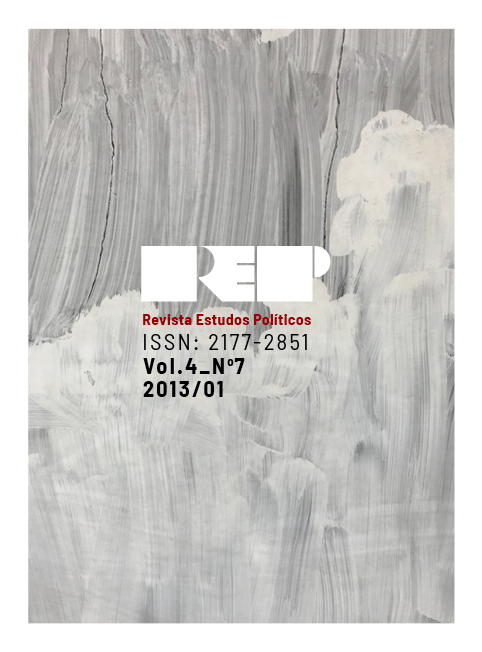The Iran-Israel-Azerbaijan Triangle: Implications on Regional Security
DOI:
https://doi.org/10.22409/rep.v4i7.40296Palavras-chave:
nuclear, Israel, Iran, Azerbaijan, attackResumo
Iran’s nuclear plans and Israel’s attempts to deter a nuclear Iran are part of the IsraeliIranian ‘secret war’, a ‘war’ which has recently spread beyond the boundaries of Israel and Iran. Accordingly, Azerbaijani officials have speculated that the Hezbollah and even Iran may be responsible for recent plans to attack an Israeli politician and members of the Jewish community in Azerbaijan. These foiled attacks and the consequent fear over potential future attacks backed by Iran have led to heightened tension between Azerbaijan and Iran and greater speculation that Azerbaijan may become a battleground of the Israeli-Iranian secret war. This article will provide a political and security assessment of Israel-Iran-Azerbaijan triangular relations, particularly in the context of Iran’s growing nuclear capability. The article shall cover the recent foiled attacks in Azerbaijan and introduce one of the main sources of tension between Iran and Azerbaijan, Iranian Azerbaijanis. Iranian fears over irredentist claims and Turkish influence over ethnic Azerbaijanis living in Iran have fuelled discrimination against this group with instances such as the Cartoon Crisis and the Lake Urmia incident. Furthermore, a background and recent developments of relations between these countries shall be provided. While relations between Iran and Azerbaijan have been historically been cordial, they have been growing increasingly more distant due to Iran’s support of Armenia in the Nagorno-Karabakh conflict, alliance with Russia in the case of the status of the Caspian Sea, attempt to influence Azerbaijan’s political and religious orientation, and due to recent events including Azerbaijan’s growing cooperation with the United States and Israel. Similarly, relations between Iran and Israel shifted from warm under the time of the Shah to sour following the Iranian Revolution, primarily due to Israeli officials’ belief that Iran has sponsored terror groups hostile to Israel, fear over Iran’s growing nuclear capability, and Ahmadinejad’s anti-Zionist rhetoric in 2007 that caused Israel to demand Iran’s expulsion from the UN. In light of these factors, Israeli officials have come to denounce Iran’s nuclear program, a move which has led to speculation that Israel may be planning an attack on Iran’s nuclear facilities. Alternatively, relations between Israel and Azerbaijan have been warm since the 1990s when Azerbaijan reached out to Israel to help rebuild its military following the Nagorno Karabakh conflict. Azerbaijan and Israel have cooperated increasingly in the areas of economics and security, a factor that has alarmed Iranian authorities who fear possible Israeli attacks on Iranian nuclear facilities. Israeli threats of attack are fiercely debated and the US has remained relatively ambiguous on this matter. Such an attack by Israelis may result in fierce retaliation by Iran either in the form of direct military strike against Israel or attacks against Israeli (and possibly Azerbaijani and US) targets all over the world. Azerbaijan’s increased military cooperation with Israel and the West, its key geographical location, and the existence of a pro-separatist Azerbaijani minority in Iran suggest that should the Israeli-Iranian secret war escalate, Azerbaijan may indeed become involved or become a proxy of Israeli-Iranian confrontation.Downloads
Downloads
Publicado
Edição
Seção
Licença
Para submeter um manuscrito, os autores devem realizar o cadastro na plataforma, fornecer os dados solicitados e seguir as orientações recomendadas. Para tanto, será necessário apresentar o número da identidade de pesquisador. Para obtê-lo, é necessário realizar o cadastro na plataforma Open Researcher and Contributor ID (ORCID).
Ao submeter um manuscrito, os autores declaram sua propriedade intelectual sobre o texto e se comprometem com todas as práticas legais relativas à autoria. A submissão implica, ainda, na autorização plena, irrevogável e gratuita de sua publicação na REP, a qual se responsabiliza pela menção da autoria.
A REP tem acesso aberto e não cobra pelo acesso aos artigos.
Orientando-se pelo princípio de que tornar público e disponibilizar gratuitamente o conhecimento científico contribui para a democratização mundial do conhecimento, a REP adota a política de acesso livre e imediato ao seu conteúdo.
No mesmo sentido, a REP utiliza a licença CC-BY, Creative Commons, a qual autoriza que terceiros distribuam, remixem, adaptem e criem a partir do trabalho, inclusive para fins comerciais, desde que se reconheça e torne público o crédito da criação original.
Para mais informações, contatar a editora através do e-mail revistaestudospoliticos@gmail.com


